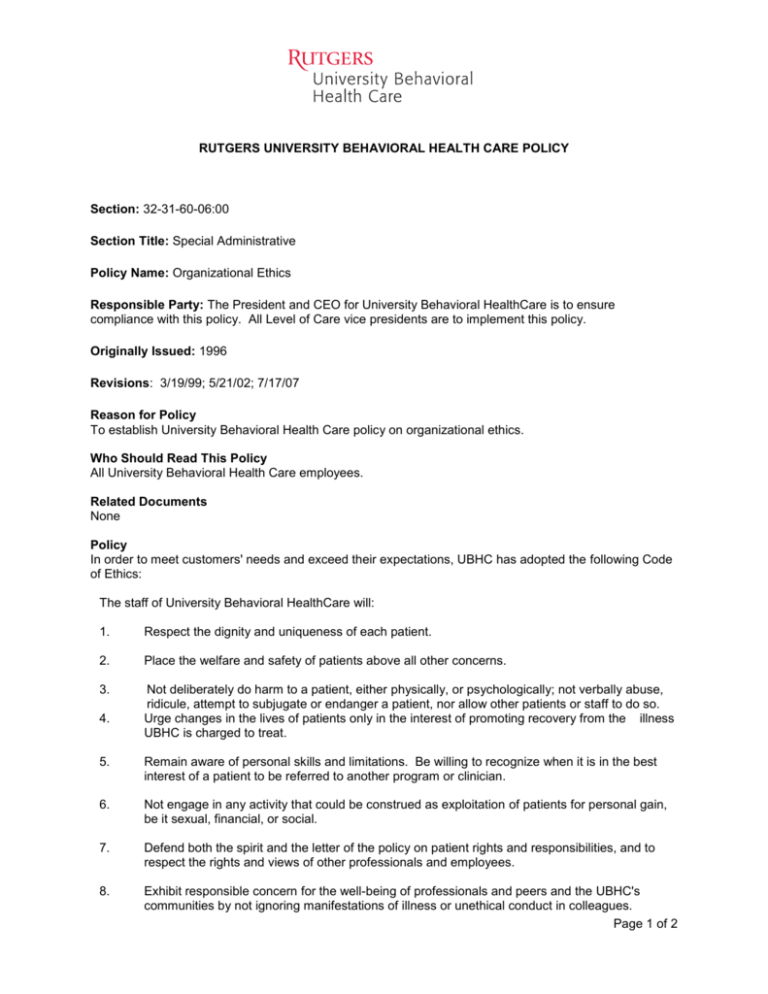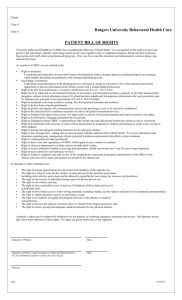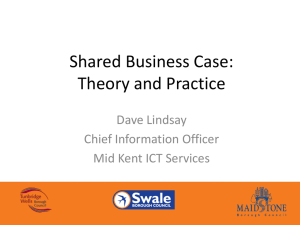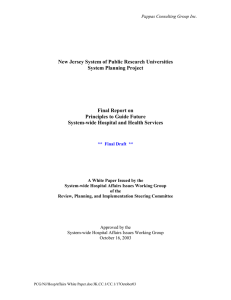
RUTGERS UNIVERSITY BEHAVIORAL HEALTH CARE POLICY
Section: 32-31-60-06:00
Section Title: Special Administrative
Policy Name: Organizational Ethics
Responsible Party: The President and CEO for University Behavioral HealthCare is to ensure
compliance with this policy. All Level of Care vice presidents are to implement this policy.
Originally Issued: 1996
Revisions: 3/19/99; 5/21/02; 7/17/07
Reason for Policy
To establish University Behavioral Health Care policy on organizational ethics.
Who Should Read This Policy
All University Behavioral Health Care employees.
Related Documents
None
Policy
In order to meet customers' needs and exceed their expectations, UBHC has adopted the following Code
of Ethics:
The staff of University Behavioral HealthCare will:
1.
Respect the dignity and uniqueness of each patient.
2.
Place the welfare and safety of patients above all other concerns.
3.
Not deliberately do harm to a patient, either physically, or psychologically; not verbally abuse,
ridicule, attempt to subjugate or endanger a patient, nor allow other patients or staff to do so.
Urge changes in the lives of patients only in the interest of promoting recovery from the illness
UBHC is charged to treat.
4.
5.
Remain aware of personal skills and limitations. Be willing to recognize when it is in the best
interest of a patient to be referred to another program or clinician.
6.
Not engage in any activity that could be construed as exploitation of patients for personal gain,
be it sexual, financial, or social.
7.
Defend both the spirit and the letter of the policy on patient rights and responsibilities, and to
respect the rights and views of other professionals and employees.
8.
Exhibit responsible concern for the well-being of professionals and peers and the UBHC's
communities by not ignoring manifestations of illness or unethical conduct in colleagues.
Page 1 of 2
9.
Not derive any material personal benefits from having transacted business on behalf of UBHC,
other than those conferred upon them directly by UBHC.
No University Trustee, Officer, Faculty or Staff Member shall have any interest, financial or
otherwise, direct or indirect, or engage in any business or transactions, or professional
activity which is in substantial conflict with the proper discharge of his or her duties at
UBHC. The professional staff and all practitioners who provide both direct and indirect
services at UBHC will abide by the ethical principles and codes for their respective
professional associations/organizations/councils/societies.
Marketing encourages the customer, regardless of social or economic status or personal
attributes, to seek help for psychiatric/mental problems at UBHC. Marketing staff employed
by UBHC shall in no way benefit monetarily or otherwise from the admission or treatment of
patients at UBHC. No material gains or promises thereof will be used as inducements for
external services to refer patients. Information from referring agencies shall be confidential
and privileged. Marketing staff shall conduct themselves at all times in conformity with the
policies of UMDNJ.
UBHC management shall review proposed contracts and reject the contract if there is a
potential conflict of interest.
On admission, expected fees and responsibilities for payment will be discussed based on
ability to pay the charity care allowance. Only services that are received by the patient will
be billed, subject to a cancellation policy where appropriate. Conflicts associated with
patient billing are handled by the fee revision process.
The admission, transfer and discharge of patients shall be done with respect for the dignity
and uniqueness of each patient. At any time during admission, transfer or discharge,
should a patient conflict arise, the Patient Advocate is available to the patient or family. If
UBHC cannot provide for the needs of the patient, UBHC will attempt to arrange other
resources.
A number of resources are available in University Behavioral HealthCare and in the
University of Medicine and Dentistry to deal with ethical concerns. When staff raise
concerns about care of patients and ethical, legal, or religious conflicts, the following
options are available:
1.
2.
3.
4.
5.
6.
Consultation with immediate supervisor;
Consultation with administrators and/or the treatment team;
Consultation with the Patient Advocate;
Consultation with the Medical Directors and/or Director of Accreditation and
Standards;
Consultation with Level of Care vice presidents, Corporate Department Heads,
or President and Chief Executive Officer of UBHC;
Consultation with UMDNJ’s Office of Business Conduct at (800) 215-9664.
If, after consultation within UBHC, a professional ethics consultation is needed, leadership may
convene such a consultation. Available consultants are in Newark at the New Jersey Medical
School and in Piscataway at the Robert Wood Johnson Medical School. Recommendations of
Ethical Consultation Teams are advisory and non-binding.
The Director, Department of Quality Improvement, should be informed by staff about ethical
issues so that trends can be identified and built into the quality improvement process. UBHC
has an ethical responsibility to the patients, staff and community it serves. Based upon the
Mission, Vision and Values Statements and strategic and operational plans, UBHC provides a
consistent ethical framework in its business and patient care operations. UBHC places the
welfare of patients and families above all concerns and supports competent care based on
patient rights, and delivered with respect and dignity to the patient. Staff who violate
organizational and professional ethics are subject to University disciplinary procedures,
including termination of employment.
Page 2 of 2











